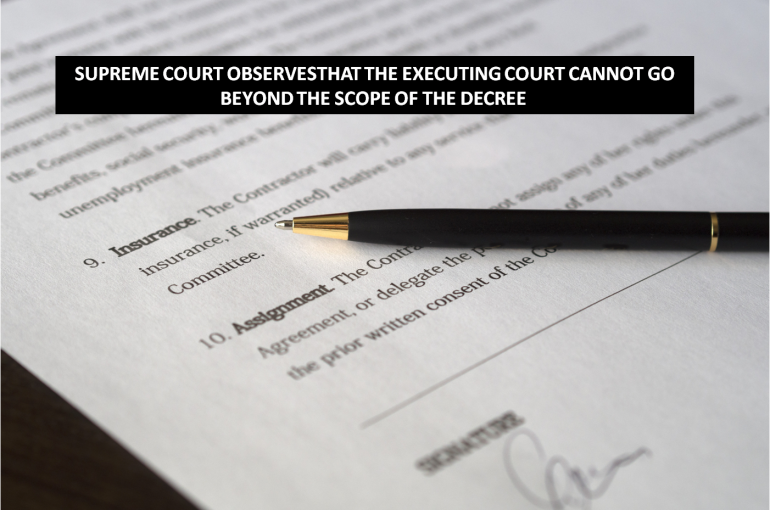SUPREME COURT OBSERVES THAT THE EXECUTING COURT CANNOT GO BEYOND THE SCOPE OF THE DECREE
A Two Judge Bench of the Supreme Court presided by Justice Krishna Murari and Justice S. Ravindra Bhat passed a Judgment dated 21.02.2023 in the case namely Sanwarlal Agrawal & Ors. Versus Ashok Kumar Kothari & Ors. in Civil Appeal No(S). 1312-1313 of 2023 and observed that the Executing Court while executing a decree cannot expand its interpretation/scope or enlarge the contested amount on account of silence of the other Party manifested through their non filing of any written statement.
Facts:
The Appellants, Sanwarlal Agrawal and Others and Respondents, Ashok Kumar Kothari and Others entered into a Joint Venture Agreement in 2017 to operate a Multi-Specialty Hospital in Malad, Mumbai. As equal shareholders, each brought in Rs10 crores as interest-free loans to finance the Project of the said Hospital. Subsequently on 27.03.2019, the Respondents bid for the entire 50% shareholding for a consideration amount of 36.75 crores, which was accepted by the Appellants and reduced in writing through Email dated 28.03.2019. Pursuant to payment of token amount of 1,83,75,000/- (that is 5%), the Respondents, by way of Email, provided a break-up of the consideration of 36.75 crores which included the initial free loan lying with the Company of the sum of Rs. 10,29,55,000/- that was to be paid back and discharged through the bank account of the Company to the Appellants. The said inclusion of the Loan Amount was expressly rejected by the Appellants.
The Respondents filed Commercial Suit No. 844/2019, for Declaration that the Agreement dated 28.03.2019 was binding on the Appellants, and for specific performance of the said Agreement which was awarded by Order dated 05.08.2019.
On failure of compliance of the said Order, the Respondents filed an execution proceeding on 13.09.2019 and so did the Appellants, on 16.01.2020. The Single Judge of the High Court of Bombay, by a common Order dated 04.01.2021, held that the decree was ambiguous and construed the decree by looking into the pleadings. It further held that in the absence of a written statement or denial of averments in the Plaint by the Appellants, the consideration amount payable under the Agreement was inclusive of the Loan Amount.
Aggrieved by the said Order, an Appeal was filed by the Appellants where the Division Bench concurred with the Single Judge’s discretion of looking into the pleadings and held that in no way, it constituted going ‘behind the decree’. Consequently, an Appeal was filed before the Supreme Court against the aforesaid Order dated 14.06.2022.
Issue:
The only issue for consideration is whether the sum of Rs. 36.75 Crores stipulated in the Agreement by email dated 28.03.2019 was inclusive of the Loan Amount of 10,29,55,000/- or not.
Supreme Court Observations:
At the outset, the Supreme Court noted the decree awarded (on agreement by both the Parties) captures, in essence, parts (A) to (D) of the prayer made by the Respondents in their suit. They are analogous to the terms of the Agreement dated 28.03.2019, which allude only to the ‘sale of the 50% shareholding of the Appellants’ and do not mention anything separately regarding the outstanding loan amount.
The Apex Court observed that as it is commonly known that the stream cannot rise above its source and that both the Courts have, by selectively perusing the emails, altered the terms of the decree to include the loan amount into the Agreement consideration. The Court further observed that it is also imperative to note that such a reading was despite the clauses in the Joint Venture Agreement entered into between the parties in 2017, which provided for a separate mechanism of settling all outstanding loans. Thus, the Joint Venture Agreement also contemplated a clear distinguishment between the bidding process and subsequent repayment of loan.
The Hon’ble Supreme Court further held that repayment of the loan amount in no manner constitutes a disruption of the ‘smooth transition’ envisioned as an aim of this transaction – thus its interpretation as such is erroneous. The Court said that both the Single Judge and Division Bench of the High Court interpreted the Appellants’ silence (manifested in their not filing any written statement) as acquiescence to the inclusion of the loan amount, which, is although worthy of adverse inference, cannot be the reason to justify expansion of the decree.
Conclusion:-
Thus, for the reasons aforesaid, the Appeal was allowed by the Supreme Court and Impugned Order dated 14.06.2022 was quashed and set aside.
Editor’s Comments
An executing court has limited powers of only executing a decree that has been passed by the court. The executing court cannot go into the decree or decide issues that ought to have been looked into by the deciding court. Any such enquiry or change made in the decree is beyond the jurisdiction of the executing court and is clearly liable to be set aside by a higher court. It is settled law that an executing court can only assist the decree holder in enforcing the decree and not beyond that.
Roopal Bardia
Associate
The Indian Lawyer
Edited by
Sushila Ram Varma
Chief Consultant
The Indian Lawyer





































Leave a Reply